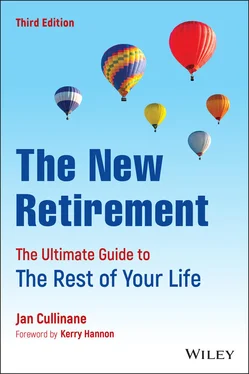Jan Cullinane - The New Retirement
Здесь есть возможность читать онлайн «Jan Cullinane - The New Retirement» — ознакомительный отрывок электронной книги совершенно бесплатно, а после прочтения отрывка купить полную версию. В некоторых случаях можно слушать аудио, скачать через торрент в формате fb2 и присутствует краткое содержание. Жанр: unrecognised, на английском языке. Описание произведения, (предисловие) а так же отзывы посетителей доступны на портале библиотеки ЛибКат.
- Название:The New Retirement
- Автор:
- Жанр:
- Год:неизвестен
- ISBN:нет данных
- Рейтинг книги:5 / 5. Голосов: 1
-
Избранное:Добавить в избранное
- Отзывы:
-
Ваша оценка:
- 100
- 1
- 2
- 3
- 4
- 5
The New Retirement: краткое содержание, описание и аннотация
Предлагаем к чтению аннотацию, описание, краткое содержание или предисловие (зависит от того, что написал сам автор книги «The New Retirement»). Если вы не нашли необходимую информацию о книге — напишите в комментариях, мы постараемся отыскать её.
The New Retirement: The Ultimate Guide to the Rest of Your Life
The New Retirement, 3rd edition,
The New Retirement — читать онлайн ознакомительный отрывок
Ниже представлен текст книги, разбитый по страницам. Система сохранения места последней прочитанной страницы, позволяет с удобством читать онлайн бесплатно книгу «The New Retirement», без необходимости каждый раз заново искать на чём Вы остановились. Поставьте закладку, и сможете в любой момент перейти на страницу, на которой закончили чтение.
Интервал:
Закладка:
It can be beneficial to talk to friends and relatives about their own shifts to retirement. For example, although my friend Carol loves to cook, she hated doing the dishes, but felt it was her “duty” to do them since she did not work outside the home. Now, Julian is doing the dishes, and they do the food shopping together, which they both enjoy. A small but important change. Ramona and Carlos were having a difficult time adjusting to “too much togetherness.” They pulled out their 1992 copy of The Five Love Languages by Dr. Gary Chapman, and reviewed and discussed which of the ways they liked to “receive” love: acts of service, gift-giving, physical touch, quality time, and words of affirmation. Carlos was doing lots of repairs around the house he never had time to do while working, and although Ramona was pleased with his “acts of service,” she really craved words of affirmation. Ramona liked surprising Carlos with little gifts, but he was really hoping for her to initiate sex … discussing what they wanted and needed went a long way toward smoothing the adjustment to an almost 24/7 togetherness.
You could also consider consulting with a counselor or couples' therapist or life coach, and/or attending retirement seminars, particularly if they address more than just financial issues. Think of redefining/renegotiating roles as a process, and gradually build that muscle called resilience. The process of adapting to retirement can be more like slowly turning a dimmer on a light rather than flipping a switch.
Pertinent Quote:“I was used to having a large team to whom I could delegate many of the things I didn't like to do; my husband would say that after I retired, I sometimes treated him as if he were one of them.” – Linda R.
Secret 3: Have Strong Social Support
This “secret” is a biggie. Bette Midler is famous for it and Donkey sang it in the movie Shrek : “But ya got to have friends.” There is an abundance of research linking social connections to longer lifespans. And, strong connections result in more than just additional years – they are healthier and happier years as well, which is why I prefer the term “healthspan” to “lifespan.” An ad for a 1946 book about aging got it right: “The important thing to you is not how many years in your life, but how much life in your years!”
A few specifics:
Harvard Health Publishing/Harvard Medical School (2019) summarized research showing that positive family, friends, and religious and community connections are as beneficial to your health as sufficient shut-eye, a healthy diet, and being a nonsmoker. Their newsletter also cited a study involving more than 300,000 people that found that a “lack of strong relationships increased the risk of premature death from all causes by 50% – an effect on mortality risk roughly comparable to smoking up to 15 cigarettes a day, and greater than obesity and physical inactivity.”
Lynn Giles, PhD, and three other researchers followed 1,500 people for 10 years and found that those with extensive social networks outlived those lacking social support by 22%. Interestingly, their research showed friends had a more powerful effect on longevity than family.
A 13-year study showed that men and women 65 years and older who were more socially active lived an average of 2.5 years longer. This study was notable because the activities included things such as playing cards, eating out, or going to movies with others. It demonstrated that social engagement alone can increase lifespan.
An interesting 2019 study, titled “Friendships That Money Can Buy,” reported by the National Center for Biotechnology Information, looked at the connection between money and social support. The authors of the study found that “greater financial security predicted greater social connectedness, which in turn supported better health.” Their conclusion? Financial security “increases opportunities for social connection.” Makes sense. If you have the financial wherewithal to join a gym or tennis center, travel, eat out socially, spend time volunteering, go to the theater, and so forth, you increase your opportunities for social interactions and creating friendships. (More on achieving financial security in Chapters 7, 8, and 9.)
We've heard the expression “friends with benefits.” Well, friends are the benefit! We all want – and need – to have someone to “play with” in retirement. It's worth noting that many of us worry about making new friends. We tend to have a lower opinion of ourselves and think we are more boring than others think we are. It's called the “liking gap,” and a study in 2018, pairing strangers together for conversations, found that people were better liked and made better impressions than they thought they did. It's very helpful to know we're more likable than we think we are!
Secret 4: Have a Healthy Body and Mind
“Heartache.” “Gut-wrenching.” Money worries that cause headaches. When we think of “mind,” we need to go beyond just the analytical structure of the brain; our mind includes beliefs, attitudes, and emotions. There has been tremendous research demonstrating the powerful effect of the mind-body connection:
One study investigated the link between positive thinking and the risk of frailty. The researchers followed 1,558 older adults for seven years and compared frailty (determined by speed of walking, strength of grip, weight loss and fatigue), with positive thinking by asking participants how many particular positive thoughts they had over the course of the study (such as “I feel hopeful about the future”). As a group, frailty increased among the aging adults, but those with positive emotions and thinking were less likely to become frail.
Another study followed 545 men for 15 years and found that the most optimistic men in the group were half as likely to die from cardiovascular disease as the men who were least optimistic.
Why does optimism work? It's thought that positive emotions may directly influence body chemicals in a way that affects health. And, positive people tend to have increased social interactions (back to Secret 3), which may result in more access to resources.
University of Pennsylvania psychologist Martin Seligman, PhD, has studied happiness and optimism for decades. Seligman suggests we go beyond seeking pleasure and instead look for gratification. What's the difference? Pleasure is not necessarily meaningful and does not always result in a greater good. For example, eating a piece of cheesecake may be pleasurable and feed your stomach, but it doesn't feed your soul. Gratification involves cultivating and nurturing your strengths and putting them to positive use. As an example, Darlene V. and Jonathan tragically lost their first child just prior to childbirth. Although devastated by the loss, they set up a foundation at a local hospital to provide indigent women with the financial resources to bury children who died under similar circumstances. Darlene and Jonathan took their strengths of compassion, generosity, and financial savvy and parlayed them into a gratifying experience in the midst of their sorrow. Likewise, we can cultivate happiness by incorporating strengths such as kindness, humor, optimism and courage into everyday life. Happiness is more of a by-product than a goal.
Martin Seligman coined the term “learned helplessness,” the concept that we internalize that nothing we do matters – that we cannot control our environment, even if we're placed in a new situation. Seligman's findings originally applied to dogs who received unavoidable mild shocks in a lab setting; when the dogs were placed in a new situation, they had “learned” they could not avoid/change their situation, and did not try to do so. Seligman says we can escape this belief that we have no control with “learned optimism.” He suggests “… not to ruminate about bad events that happen to you … I recommend fun distractions, because studies show that if you think about problems in a negative frame of mind, you come up with fewer solutions.” We can train ourselves to think more optimistically and put a stop to distorted ways of thinking. When you think negatively about something, note it, evaluate it, and replace the thought with something more realistic. It takes practice, but it's an effective tool for increasing happiness.
Читать дальшеИнтервал:
Закладка:
Похожие книги на «The New Retirement»
Представляем Вашему вниманию похожие книги на «The New Retirement» списком для выбора. Мы отобрали схожую по названию и смыслу литературу в надежде предоставить читателям больше вариантов отыскать новые, интересные, ещё непрочитанные произведения.
Обсуждение, отзывы о книге «The New Retirement» и просто собственные мнения читателей. Оставьте ваши комментарии, напишите, что Вы думаете о произведении, его смысле или главных героях. Укажите что конкретно понравилось, а что нет, и почему Вы так считаете.












